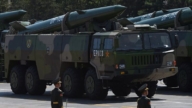【新唐人2011年4月27日讯】大陆对银行业金融机构展开新一轮房贷压力测试,而且这次设定的房价可能下跌幅度更大。那么,在中共出台了一系列的房价调控政策之后,中国的房价会不会大幅下降呢?我们听专家的分析。
最近,中国银监会主席刘明康在今年第二次“经济金融形势通报会”上表示,将进行新一轮的“银行房地产贷款压力测试”。
假设的情况分为三种:分别为房价平均下跌30%、利率上调27个基点;和房价下跌40%、利率上调54个基点;以及房价下跌50%、利率上调108个基点。这一轮压力测试的最后结果,将决定银监会是否出台进一步紧缩房地产信贷的政策。
新一轮房贷压力测试还将北京、上海、深圳、广州、重庆、杭州、南京等7大城市,列为房贷高风险地区,按照房价下跌幅度的条件,测算房地产贷款受冲击的情况。
那么,中国的房价真的会大跌吗?
美籍华人,经济时政评论家草庵居士认为,中国的房地产泡沫已经达到顶峰,但与全球的其他房地产泡沫有明显的不同。
草庵居士(经济时政评论家):“在中国是地方财政非常依赖房地产,而且土地不是个体,不是私人所有,而是由政府所有,政府出让。所以这就决定了中国房地产非常明显的特征,这个特征就是房地产的价格跟土地的财政、政府的收入有密切相关的关联。”
据官方资料显示,去年中国国有土地有偿出让收入超过2.9万亿元人民币,同比增加106.2%。“十一五”期间,也就是2006-2010年,中国土地出让总收入高达7万多亿元人民币。在有些县市,土地出让金占财政收入比重已超过50%,甚至占80%以上。
大陆国家土地副总督察甘藏春也承认,地方政府客观上促使了多卖地、快卖地、早卖地、贱卖地,牺牲了子孙后代的利益。
最近,中共当局出台了很多政策,声称要打压房价,但中国多数城市的房价仍在上涨。
草庵居士指出,中共当局要求房地产商降低成本,以降低房屋售价,但实际上房地产商降价的空间是有限的。
草庵居士:“大家都知道在整个楼房建设当中,70%是土地跟税费,而30%才是房地产成本和利率,真正的压缩空间在于政府,而不在于房地产商,所以中国政府在目前的状况下,它会不断的出台政策,调整,实际上是中央政府跟地方政府的博弈,而跟房地产(商)的关联并不大。
4月18号,国家统计局最新公布的数据显示,3月份70个大中城市,新建商品住宅环比价格下降的只有12个城市,同比价格下降的城市仅有2个。
草庵居士:“如果政府不打压房地产,房地产走向极端的时候,资金就会崩溃,这时候,国营银行就会承担最大的损失,这时候整个中国经济会陷入萧条,陷入崩溃状态。但是如果打压房地产,地方政府收入就会减少,这种情况下,地方政府就会难以维持。矛盾就会从中央银行方面转嫁到中央与地方,地方与民众之间,地方政府缺少资金,缺少人员维持,就会出现地方管制上的一个问题,地方政府也会出现暴乱的问题。”
上海财经评论人士叶檀在英国《金融时报》撰文说,每个人都希望面对健康、理性的市场,但中国的房地产市场既不健康也不理性。
那么中国的房价由谁决定呢?叶檀说,行政手段是最肃杀的工具,可以让市场瞬间凝结。她认为,中国的房地产价格不是能不能降的问题,而是敢不敢降的问题。
新唐人记者曾耀贤、肖颜、特约记者高紫檀采访报导。
China Housing Prices To Fall?
Chinese banks have started a new round
of stress tests regarding mortgages. This time,
the housing prices are set to have a larger decline.
Chinese Communist Party (CCP) has recently issued
new housing price control policies.
Will they cause the prices to decline?
China Banking Regulatory Commission’s (CBRC)
director Liu Mingkang said during
the 2nd Economic Briefing that a new round
of bank mortgage stress test was underway.
The stress test will have 3 scenarios:
house price (HP) declines by 30%,
while interest rate (IR) increases by 27 bps;
HP decreases by 40%, while IR is up by 54 bps;
HP decreases by 50% while IR is up by 108 bps.
CBRC will decide according to the stress test results
whether it needs to tighten its housing credit policy.
Seven cities are classified as being at high-risk
for mortgages. They are Beijing, Shanghai, Shenzhen,
Guangzhou, Chongqin, Hangzhou and Nanjing.
The test will estimate the impact on mortgages,
based on the extent of housing price drop.
Will China’s housing prices have a dramatic decline?
Economist and commentator Willam F. Mei said,
that China’s real estate bubble has reached its peak,
but it is distinct from other real estate markets.
Mei: “In China, local public finances rely
on real estate. The land is owned and let
by the government. So China’s real estate price
is largely linked with land finances
and government revenues.”
According to official data, in 2010 the paid transfer
of state-owned land gained over RMB2.9 trillions,
a year-on-year growth of 106.2%. Similarly,
RMB7 trillions were earned from 2006 to 2010.
In some counties, land transfer revenue
is ranging from 50% to 80% of the total revenue.
China’s Land Bureau Deputy Chief Gan Zangchun
admitted that local governments hastened people
to sell land cheaply at future generations expense.
Despite a lot of new policies to curb house prices,
they still increase in many Chinese cities.
Mei said, CCP urged the estate developers to lower
housing prices by reducing construction costs.
However, there is a little room to reduce such costs.
Mei: “In the process of house construction,
70% of the price is composed of land cost and taxes,
only 30% is from construction costs and interests.
It is up to the government to reduce these costs.
The new policies reflect the in-fighting between
the CCP’s central and local governments.”
As per new data from National Bureau of Statistics,
only in 12 out of 70 large and mid-sized cities
the new commercial and residential buildings’
prices have dropped.
Mei: “If authorities don’t curb the real estate market,
and let it go to the extreme, finance would collapse.
The state-owned banks would bear the losses.
The entire economy would fall into depression.
If they curb the real estate market,
local governments’ income would be reduced.
They would have difficulty maintaining themselves.
Conflicts would be shifted from the central
to local governments, which lack of funds
and personnel to ‘maintain stability’ would lead
to control issues. There would be a turmoil.”
Shanghai-based financial commentator Ye Tan
wrote in the UK’s Financial Times, that
everyone wants a healthy and rational market,
but China’s real estate market is neither.
Who decides China’s housing prices? Ye Tan said,
administrative measures are the most chilling tools.
They have the power to freeze the market instantly.
She believes that China’s housing price issue is,
do the authorities dare to curb the prices or not.
NTD reporters Zeng Yaoxian, Xiao Yan and Gao Zitan




























